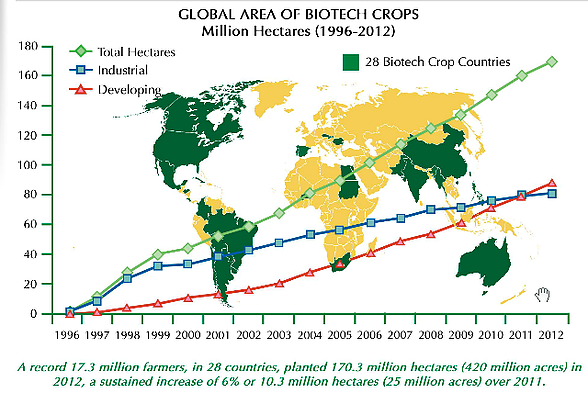The correlation between improved bio-engineering techniques/methodologies and optimum productivity is striking, and it must be accepted that the science and technology of GMO is a prerequisite for varied solutions in the challenges we are facing as a society today while providing cutting-edge solutions for the future. The impact of Genetically Engineered Organisms (GMO’s) is undeniable and its concepts and application pivotal to the social, cultural, political, economic, and environmental wellbeing of many nations.
Social Impact
Genetically Engineered Organisms have seemingly invaded the culture and subculture of Industrialized and emerging nations having both positive and negative results. The social impact is especially centered around the labeling of genetically modified food with individuals taking a stand and protest to highlight what they believe in. It is evident that GMO’s have been around for centuries and have had significant impact on our everyday life yet have only now being labeled due to the exposure of the science behind today’s organisms, and the perceived fear expressed by detractors. GMO food is all around us and have been since ancient culture have seen the need to select species with specific genetic features and behaviors to produce better value in future generation by producing more food, stronger and more plant and animals for disease resistant, and to produce better plants and animals.
The domestication of animals played a pivotal role in making cultures become more mobile by taming/breeding horses and other animals for riding, transportation, and farming, so too were animals domesticated for protection and companionship, for food and clothing. Genetically engineering can have a positive and beneficial effect on the food we eat as they can be modified to have more vitamins and minerals, in addition to simply being made to taste better. Many individuals fear the unseen risks of genetically engineered food, yet many believe there must be some measure of risk involved in its consumption (Komparic (2016). While the use of genetic engineering has provided impactful solutions for famine in many parts of the world, natural disasters, medical breakthroughs, pest and disease control. America’s approach and use of GMO technology is central to the education of the masses, as the nation has the requisite science and technology to provide the catalyst for the dissemination of information to individuals. Education and supporting technology is therefore needed to provide clarity on the issue, with ongoing dialogue to provide impetus for acceptance within the various cultures.

Cultural Impact
The social impact of Genetically Modified Organisms is to first empower peasant farmers and their local communities to overcome the lack of food and hunger by ably providing for their family and community. Stephen Brush (2001) in writing for the Indiana Journal of Global Legal Studies notes the effect of GMOs on the medical profession through the conflating of genetic resources and agriculture, and the ecologic and social impact of problems resulting from the use of recumbent DNA technology. His discussing and argument are that the negative effect of GMOs on our culture and subculture was grossly understudied, and that further investigation is needed to fully understand its impact.
The positive impact of GMO on our culture and subculture is highlighted by giving notice of the benefits and rewards to be reaped in its usage, as well as the inter-dependencies created through business and social interactions resulting in a more streamlined social structure and broader inclusivity. Genetically modified organisms will reshape many cultures today and for the foreseeable future as farming practices will continuously improve and species evolved to minimize the effect of diseases, mitigate the effect of dangerous chemicals on individuals and ecology, and drive sustainable agriculture. Cultural practices and beliefs will change in the face of the GMO revolution as nations are educated and governments emphasize the use of safer production practices for food production.
Political Impact
The main points that drive GMO’s political impact is the belief by many that genetically modified food should be identified through labeling. Currently in America and Canada labeling is not required under the law, while in other countries GMOs are banned or subject to some other restriction. Labeling is the main political requirement and a serious issue with arguments on both sides of the debate since there are positive and negative arguments regarding packaging/labeling.
Central to the impact of politics in the GMO debate is the part government and legislature should play in educating people on the availability of the science for better health and food choices, the rigorous testing of methodologies, techniques, and reporting of adverse findings to provide fodder for continuing dialogue and transparency within the debate. Politics should reflect the will of the people and to also guide a nation’s national concerns and security. Politics through the enacting of pertinent legislation should therefore provide guidance in the GMO debate notwithstanding the individual’s right to choose under the constitution.

Economic Impact
The support for Genetically Modified Organisms remains high as data and information suggest that it is one of the most cost-effective means of producing more food for current and future populations. The amount of crop that that can be grown and survive through genetic engineering make organic crops and animals products produced pale in comparison. Organic plants and animals are prone to disease and the effect of insects, forms of natural disasters, excess use of manure/fertilizers, and deterioration of species over time. These are expensive items and procedures that require significant investment of financial resources to see equivalent returns on investment. With production operations in agriculture, fishing, and animal husbandry GMO’s equals the playing field with less financial resources and effort used to gain better results.
For the successful farmer as well as those experiencing financial challenges, genetically engineered food is the equalizer that allows all involved to save money and make a profit. Additionally, land use is maximized using genetically modified crops, and the amount of acreage used has increased exponentially over the years, so too has the profit margin.
The use of modern biotechnology to create genetically modified organisms have enhanced main food agricultural crop in ways that were not possible years ago. An examination of the graph indicated the number of farmers beginning in 1996 developing (red) across nations, the countries who have adopted biotechnology to provide solutions for production challenges (green), those using industrial methodologies, and the total hectares under production in 2012. It can be seen clearly that as the application of biotechnology is embraced, significant results are seen in industrial nations compared to its use in developing countries.
Environment Impact
The environmental impact of GMO’s is arguably the most accepted results yet, with both proponents for and those against agreeing that the impact is beneficial to the environment. GMO’s allow farmers to utilize less land acreage using more advanced techniques, better seed production and selection, and plants that are more robust due to insect resistant mitigating the over-use of damaging chemicals for insect control, the growth of plant less susceptible to drought minimizing the costs associated with irrigation, less use of chemical fertilizers with harmful side effects, and the ability to practice absolute weed control thereby having a positive on the ecosystem.
The impact of GMO’s is reshaping our society and lives as evident in its impact on our social, cultural, political, economic, and environmental sphere of our nation. The repercussions will be felt in every area and level of our society as science and technology strive to provide solutions for personal and societal problems by applying cutting-edge knowledge in a more efficient, more productive way, albeit seen by the majority as intrusive and unconscionable.

12 thoughts on “GMO’s: Impact Analysis”
啥也不说了,希望疫情早点结束吧!
Simply want to say your article is as amazing. The clarity in your post is simply nice and i could assume you’re an expert on this subject. Fine with your permission let me to grab your RSS feed to keep up to date with forthcoming post. Thanks a million and please keep up the gratifying work.
Good post. I learn one thing tougher on completely different blogs everyday. It should all the time be stimulating to read content material from different writers and follow slightly one thing from their store. I’d desire to use some with the content material on my blog whether you don’t mind. Natually I’ll provide you with a hyperlink on your internet blog. Thanks for sharing.
As I website possessor I conceive the content material here is real superb, thankyou for your efforts.
Thank you, I’ve just been searching for info approximately this subject for a long time and yours is the best I’ve came upon till now. But, what about the bottom line? Are you positive about the source?
Hi my loved one! I wish to say that this post is amazing, nice written and include approximately all important infos. I would like to see extra posts like this.
Sweet blog! I found it while searching on Yahoo News. Do you have any suggestions on how to get listed in Yahoo News? I’ve been trying for a while but I never seem to get there! Many thanks
It is quite enjoyable for me to read through a piece that can provoke thought in both men and women. Please accept my gratitude for allowing me to leave a comment.
Good day! Do you use Twitter? I’d like to follow you if that would be okay. I’m definitely enjoying your blog and look forward to new updates.
Thanks for breaking down the complexities, made it much easier to grasp.
Regards for this post, I am a big fan of this web site would like to go on updated.
Thanks for sharing excellent informations. Your site is so cool. I am impressed by the details that you have on this web site. It reveals how nicely you understand this subject. Bookmarked this web page, will come back for more articles. You, my friend, ROCK! I found simply the information I already searched all over the place and just couldn’t come across. What a great web site.